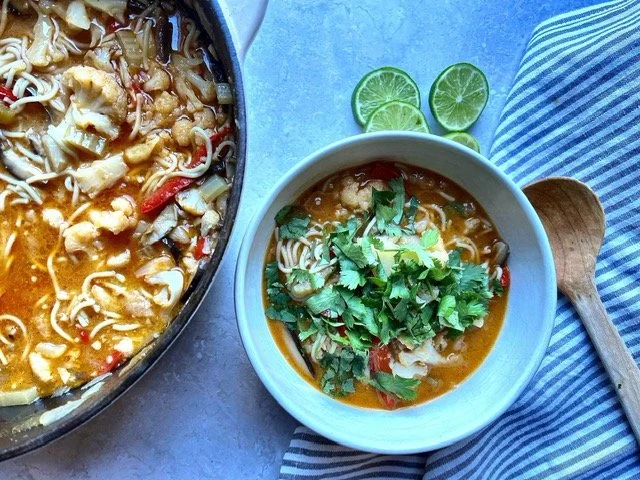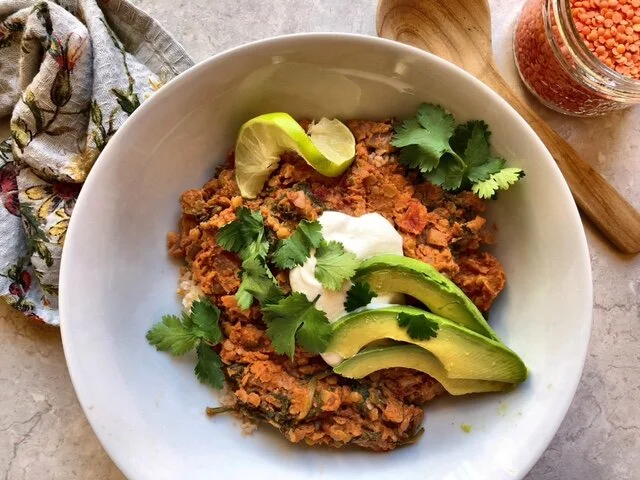Just.
YUM.
This soup is deeply nourishing and satisfying and originally went without the ramen noodles, but we’ve just decided that it’s better with! You could easily bulk up this soup with some cooked chicken or baked tofu, but we love it just the way it is. This makes an easy, nourishing weeknight meal, that will likely provide you with lunch or dinner a few times over.
Cooking Tip:
SLOW AND LOW IS THE WAY TO GO!
I see a lot of folks these days opting for the Instapot or an Air-Fryer because of the huge upside of convenience. While I do truly understand the demand for quick meal delivery, nutritionally speaking, these are not good options for nutrient value. Both methods are quick cooking and use high heat, having some pretty grave detrimental effects on the nutritional quality of your food and your health long term.
Health Detriments of High-Heat Cooking:
Cooking food at high temperatures changes its chemical structure, producing toxic products called NFCs, such as trans-fatty acids (TFAs) and advanced glycation end-products (AGEs), both of which damage blood vessels and can contribute to high blood pressure and hardening of the arteries
Advanced Glycation End Products (AGE’s) are a culprit in many disease processes, such as degenerative eye diseases & cataracts, diabetes, heart disease, stroke, renal disease, aging and Alzheimer’s disease
Excessive glycosylation leads to impaired bodily functions, decreased immune function, increased autoimmune disease, diabetes, and increased free radical damage throughout the body, thus increased Cancer risk
High heat cooking destroys 30 - 50% of mineral value and 90 - 100% of enzymes, which are needed for all metabolic activity in the body
Proteins become coagulated, making them less accessible and usable for the body, impacting the body’s ability to break them down and, thus, damaging the digestive system
Coconut Curry Cauliflower Soup
Serves 6-8
3 Tbsp coconut oil
1 large onion, diced
1 tsp salt
4 cloves garlic, minced
2 Tbsp fresh ginger, minced
1/2 a hot pepper, seeds removed and minced (optional)
3 cups chopped cauliflower (about 1 medium)
2 celery stalks, diced
4 cups sliced shiitake mushrooms
1 red pepper, thinly sliced
1 stalk fresh lemongrass, minced, or 1 Tbsp lemongrass paste
4 cups vegetable broth/stock
2 Tbsp red curry paste
1 can of full fat coconut milk
2 blocks of gluten-free ramen noodles
2 Tbsp tamari
1 Tbsp toasted sesame oil
1 Tbsp maple syrup
Juice of 1 lime
1 bunch cilantro
Salt and fresh pepper to taste
Heat coconut oil in a large pot on medium. Add the onions and cook until lightly softened. Add salt, garlic, ginger, and saute another few minutes. Add celery, cauliflower, mushrooms and peppers and sauté until vegetables are slightly softened (10 mins).
Heat your broth in a medium pot and whisk in the curry paste.
Add the curried broth, coconut milk, and lemongrass.
Bring the soup to a boil and then simmer on low, covered, for 15 mins or until the vegetables are tender.
Add your blocks of ramen and simmer another 8 - 10 minutes, stirring with a fork to separate the noodles.
Add the tamari, toasted sesame oil, maple syrup, and lime juice. Season with salt and pepper to taste. Stir in chopped cilantro and serve.
ENJOY ♡
If you make this recipe, please let me know in the comments below how much you loved it or what you did differently!
References:
High Heat Cooking & Cardiovascular Disease





